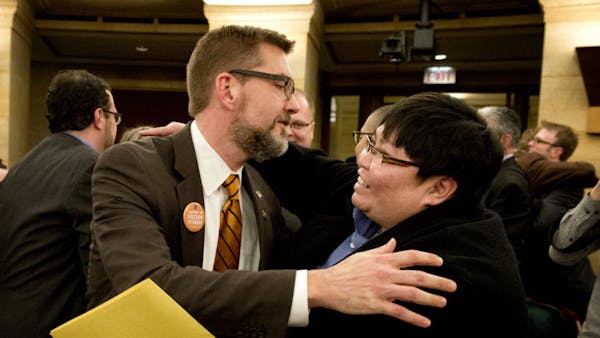Margorie Holland. Anna Hurd. Kira Trevino. Manya Johnson.
The four Twin Cities women are among eight women killed so far this year in Minnesota, allegedly by husbands or boyfriends they were trying to leave.
Domestic violence victims' advocates decry the grim numbers and say that while demand for their services is up, funding for them continues to dwindle, even as the spate of recent domestic killings has shocked local communities.
On Tuesday, several hundred friends and family members wearing T-shirts depicting dozens of victims, women's advocates and abuse survivors gathered at the State Capitol and called on legislators to provide $3 million in funding for the next two years to combat domestic violence.
Domestic violence is "not just a women's issue," but a public health issue that inflicts lifelong damage on those connected with its victims, said Dr. Edward Ehlinger, Minnesota's health commissioner.
"It won't go away unless we collectively work on this issue," he said.
With eight Minnesotans slain so far this year, domestic violence homicides are on a pace to exceed last year's toll of 18 killed.
Six counties and the northern portion of a seventh, St. Louis County, as well as four reservation communities, no longer receive state funding for domestic abuse services, said Liz Richards, executive director of the Minnesota Coalition for Battered Women.
In the past eight months, three domestic violence programs in Fillmore, Carlton and northern St. Louis counties closed, as did satellite offices, she said.
"It's very alarming," said Bree Adams Bill, program manager at St. Paul Domestic Abuse Intervention Project.
At the center where Adams Bill works, calls have been pouring in from women who worry that they, too, might be killed, said Executive Director Shelley Johnson Cline. The victims have heard about Trevino, Johnson, Hurd and Holland, all of whom were slain as they tried to break off intimate relationships. The callers are asking for help in getting orders of protection, Cline said.
Last year, 63,267 victims sought services from Minnesota domestic violence programs, but that represents a small number of victims, because only about one out of every five victims seeks services, advocates said.
While state funding has decreased over the years, so has funding from other sources. Giving from foundations and donors fell 10 to 20 percent in the past two years, victims' advocates say.
With safety-net programs shrinking, more people also are turning to domestic abuse programs for help, including help in finding places to live when they are made homeless by the violence, Richards said.
Those who experience violence need to know that when they reach out for help, they can find a program that will understand their culture, said Dr. Oliver Williams of the University of Minnesota's Institute on Domestic Violence in the African American Community.
"Violence against women is preventable, but to be successful, we need continued funding and support from policymakers, business leaders and the wide range of communities that make Minnesota great," Williams said.
Rally moderator Sarah Deer, a professor at William Mitchell College of Law in St. Paul, said, "More than one in three women have experienced rape, physical violence or stalking by their intimate partner," and American Indian women are raped three times more often than other women. She urged the state to spend more on sexual violence prevention.
Liliana Espondabaru, an advocate who works with the Community University Health Care Center, said those at the Capitol were there for the victims who could not be. She drew cheers when she urged the crowd to fight for state funding, and for human rights.
"We can stop sexual violence," she said. "That is my dream."
Joy Powell • 651-925-5038
Biden will assail Florida's 6-week abortion ban as he tries to boost his reelection odds
What to know in the Supreme Court case about immunity for former President Trump

Tabloid publisher says he pledged to be Trump campaign's 'eyes and ears' during 2016 race

